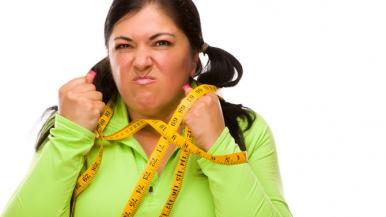Have you said, or thought, "I look fat" hundreds of times? And despite reassurances from your friends, spouse and maybe even your doctor, do you still feel flabby?
If you're hung up on some aspect of your physical appearance, you're not alone.
Millions of men and women bash their bodies for one reason or another. So why do so many of us find fault with ourselves? How can we learn to accept the way we look, flaws and all? And how do we know if our insecurities — or those of our spouses, friends or children — are actually something more serious, such as body dysmorphic disorder, or BDD?
Megan Hood, PhD, a clinical psychologist at Rush University Medical Center, offers some valuable insights about body image and BDD.
Why our looks have such an impact on our self-esteem
Many of us see our bodies as an outward way of showing how we think about ourselves. So when we are dissatisfied with our bodies in some way, we may take the leap and think this means something about who we are as people. Wrinkles can make us feel old; weight issues can make us feel as though we don't have control of our behaviors or health.
These kinds of feelings affect how we see ourselves overall and our sense of self-worth.
How other people's perceptions affect us
Other people's opinions can be a big factor for many people. Evaluation from others will contribute to our self-esteem, especially when we’re young and just figuring out who we are. Feedback makes a big difference in young children.
How often do we say without thinking, "You’re such a cute little girl," or "You're a strong little boy"? Comments about looks get ingrained in how we develop and think about ourselves. It's true with other things as well, such as whether we're athletic or smart.
Media and cultural expectations are also influential factors. When magazines or T.V. shows, for example, present their version of the right or the wrong way to look, that can make a big difference in how we feel about ourselves.
One example may be postpregnancy pictures of celebrities in magazines — they set such an unrealistic expectation for a lot of women. What gets left out is what resources these women had in terms of personal trainers and personal chefs, or how body metabolism is going to be different in different women.
Helping our kids have positive self-images
Instead of commenting just on the cute outfit they have on, ask them about their favorite book or what their soccer game was like the other day. At an early age, help them recognize that they are made up of lots of different characteristics, not just how they look.
Also, as parents we should be paying attention to what our kids are being exposed to via the media and teach them how to handle those messages as best they can when they pop up.
That means sitting with your kids when they are watching T.V., and talking about their reactions to what they see. This helps children be critical thinkers about body image. It's a tricky skill, but it can be developed.
The importance of being a good role model
Parents definitely need to be good role models, which is easier said than done since we all have issues we're sensitive about. But kids are sponges, and they pick up more than we know. When you say "I didn’t exercise today, and I feel like such a slob," kids absorb that idea.
So be careful in what you say and how you act: How you see yourself, and how you express that view, can play a big role in your child's developing self-esteem and self-image. For example, if you diet, try to describe your lifestyle changes to your children in the context of being healthy and taking care of yourself rather than focusing on things you dislike about yourself.
Think of yourself as multifaceted. Recognize that how you look is not the only factor in terms of how people get to know you. Your personality and attitude are really what make you shine.
Learning to accept how you look
Think of yourself as multifaceted. People are visual, so looks can't be totally ignored. But recognize that how you look is not the only factor or even the strongest factor in terms of how people get to know you. Your personality and attitude are really what make you shine and make that lasting impression.
Also, focus on your thoughts. Try to catch your distorted or negative thoughts and make them more realistic when you can.
Worried that everyone is looking at your thighs at the beach? Recognize that, yes, a few people may look, but certainly not everyone is looking. And not everyone looking even cares about your thighs.
By doing that, you start to see that there's a different way to view the situation. And now that you have another way of looking at it, maybe you won't go to that place again mentally — or at least not as often.
When is it body dysmorphic disorder?
More than half of Americans have some sort of dissatisfaction with their body, but body dysmorphic disorder, or BDD, is pretty rare.
The big difference between what's "normal" and what isn't is the degree to which your feelings and thoughts impact your life. Is it interfering with school? With your social life?
Not wanting to go out because of a pimple or a bad hair day happens on occasion, but if your social life is nonexistent because of it, that can be really impairing. That's a sign that there may be a problem.
Body dysmorphic disorder is characterized by two things. First, preoccupation with one or more perceived flaws in terms of our appearance that may or may not be noticed by others. Second, there are obsessive behaviors in an effort to alleviate the anxiety around that appearance concern. Examples of that would be the following:
- Frequent mirror checking
- Excessive grooming
- Skin picking
- Seeking reassurance from others
In BDD, the degree of these behaviors is excessive: Individuals may spend three to eight hours a day (or more) on these obsessive behaviors. BDD is also usually about a specific body part or parts, such as skin, hair or nose.
How body dysmorphic disorder is treated
Hood: After it's diagnosed by a mental health professional, psychotherapy — often cognitive behavioral therapy — is typically recommended. Medications may be prescribed as well to help decrease the obsessive thoughts and behaviors.
In therapy, we help people with BDD decrease certain behaviors and learn how to tolerate the distress that relates to them. For example, learning how to avoid checking the mirror repeatedly or reassurance seeking can help decrease the level of distress.
So how can we decrease that obsessive behavior? We develop coping strategies, such as deep breathing, relaxation strategies and self-statements (e.g., "I don't need to look in the mirror" or "How I look right now doesn't have anything to do with who I am"). Bringing family support on board can also be helpful.
That strategy can also work for those who struggle with self-image but don't have BDD.
Developing personally relevant self-statements, such as "My looks don't define who I am," or challenging negative and anxious thoughts that you experience can be helpful in getting anyone away from the mirror and out to the beach.




